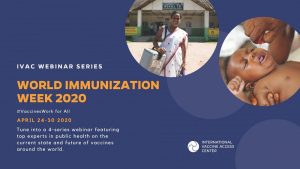The International Vaccine Access Center (IVAC) hosted a series of webinars to celebrate World Immunization Week, April 24-30, 2020.
Measuring the Economic Impact of Vaccines
Date: April 27, 2020
Description: The webinar will present the estimates from the Decade of Vaccine Economics (DoVE) study of the economic benefits and return-on-investment of vaccines against 10 antigens in 73 low-income countries. The webinar will begin with an overview of the methodology used to compute these estimates and then showcase how we apply these methods to calculate the return-on-investment from 2011-2020 and predict the future return-on-investment from 2021-2030.
VoICE: Using High-impact Evidence for Immunization Advocacy
Date: April 28, 2020
Description: This webinar will show how the VoICE tool can be used to synthesize high-quality evidence from across disciplines to support high-impact advocacy messaging that demonstrates the value of vaccines for all people. Immunization is one of the most successful health interventions in the history of medicine, saving millions of lives every year. But the true impact of vaccination is much more far-reaching, benefiting national economies, strengthening health systems, and reducing gaps in equity.
Are We Ready to Deliver COVID-19 Vaccines to Older Adults?
Date: April 29, 2020
Description: A COVID-19 vaccine could be available within a year to 18 months, but is the world ready to deliver vaccines to older adults, who are at increased risk for severe outcomes from COVID-19 and other vaccine preventable diseases? This webinar will discuss the status of current adult vaccine programs around the world; the gaps in countries with and without programs currently in place; and the data and actions needed to enable successful deployment of a novel coronavirus vaccine in an equitable manner.
Protecting Vaccine Programs in the Era of COVID-19
Date: April 30, 2020
Description: The COVID-19 pandemic has the potential to have significant effects on routine immunization programs due to the burden on the health system, physical distancing requirements and reluctance by people to seek vaccination. Previous outbreaks such as Ebola have resulted in lowered coverage of routine vaccines, leading to outbreaks of preventable disease like measles. What do we know about how countries are responding so far to protect their vaccine programs? What principles has WHO established to guide countries on routine immunization during the pandemic and as coronavirus infections subside?
